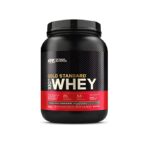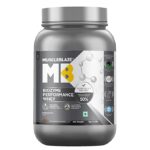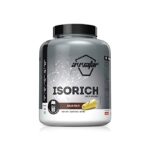Protein is an essential macronutrient that plays a crucial role in the growth, repair, and maintenance of various tissues in our body. One popular source of protein is whey protein, a complete protein derived from milk during the cheese-making process. Many fitness enthusiasts and athletes incorporate whey protein into their diet to support their fitness goals and enhance muscle recovery. However, it’s important to understand the appropriate daily intake of whey protein to ensure safety and optimize its benefits. In this article, we will explore how many scoops of whey protein in a day is safe and provide guidelines for its consumption.
1. Introduction
In recent years, whey protein has gained immense popularity as a dietary supplement due to its convenience and high protein content. It is available in powder form, making it easy to mix into shakes, smoothies, or other beverages. While whey protein offers numerous benefits, it’s essential to use it responsibly and avoid exceeding the recommended daily intake.
2. What is Whey Protein?
Whey protein is a byproduct of milk processing, specifically during the cheese-making process. It contains a rich profile of essential amino acids, including branched-chain amino acids (BCAAs), which are vital for muscle protein synthesis and recovery. Whey protein is easily digestible and quickly absorbed by the body, making it an ideal choice for post-workout nutrition.
3. Benefits of Whey Protein
Before delving into the safe daily intake of whey protein, let’s briefly discuss the benefits it offers. Whey protein is renowned for its ability to support muscle growth and repair due to its high biological value and amino acid composition. It provides a convenient source of protein for individuals who struggle to meet their daily protein requirements through whole food sources alone. Additionally, whey protein may aid in weight management, improve immune function, and enhance satiety.
4. Recommended Daily Intake of Whey Protein
Determining the appropriate daily intake of whey protein depends on various factors, including an individual’s specific goals, body weight, activity level, and dietary preferences. To ensure safety and effectiveness, it’s essential to consider these factors while incorporating whey protein into your daily routine. As a general guideline, Most people can safely consume 1-2 scoops of whey protein per day. It’s important to consult with a healthcare professional or nutritionist for personalized advice.
-
Factors to Consider
When determining your optimal whey protein intake, consider the following factors:
a) Fitness Goals: The amount of whey protein you consume will vary based on your fitness goals. If your aim is to build muscle mass, you may require a higher protein intake compared to someone who is primarily seeking weight maintenance or general health benefits.
b) Body Weight and Composition: Your body weight and composition influence your protein needs. Generally, individuals with higher body weights may require more protein to support their muscle mass and recovery.
c) Activity Level: Those who engage in intense physical activity or endurance training may have higher protein requirements due to increased muscle breakdown and repair.
d) Dietary Preferences: It’s important to consider your dietary preferences and overall macronutrient distribution. Whey protein can be a valuable supplement to meet your protein needs, but it should complement a well-rounded diet.
-
General Guidelines
As a general guideline, the American Dietetic Association suggests a daily protein intake of 0.8 grams per kilogram of body weight for the average sedentary individual. However, for individuals involved in intense exercise or strength training, the protein requirement may increase to 1.2-2.0 grams per kilogram of body weight.
To calculate your recommended whey protein intake, multiply your body weight (in kilograms) by the desired protein intake (in grams per kilogram of body weight). For example, a person weighing 70 kilograms aiming for 1.5 grams of protein per kilogram of body weight would require 105 grams of protein per day.
5. Safety of Whey Protein Consumption
Whey protein is generally considered safe for consumption when used appropriately and within recommended doses. However, it’s crucial to be aware of potential side effects and allergies that can occur in some individuals.
-
Side Effects
Excessive whey protein consumption can lead to digestive issues such as bloating, gas, and diarrhea. To avoid these side effects, it’s recommended to start with smaller servings and gradually increase the amount over time.
-
Allergies
Individuals with lactose intolerance or milk allergies may experience adverse reactions to whey protein. If you have known sensitivities or allergies, it’s essential to choose whey protein isolate or hydrolysate, which have lower lactose content.
6. Personalized Protein Needs
To determine the ideal number of scoops of whey protein in a day for your specific needs, it’s advisable to consider your personal circumstances and goals. Here are some factors to keep in mind:
-
Fitness Goals
If your primary objective is muscle gain, consuming 1-2 scoops of whey-protein per day may be appropriate. This can help ensure an adequate protein supply to support muscle protein synthesis and recovery. However, if your goal is weight maintenance or general health, a lower intake of 1 scoop per day might be sufficient.
-
Body Weight and Composition
Larger individuals or those with higher body fat percentages may require a higher protein intake to support their weight management or muscle-building efforts. Adjusting the number of scoops based on your body weight and composition can help personalize your protein intake.
-
Activity Level
If you engage in regular physical activity or intense workouts, consider increasing your whey- protein intake accordingly. 1-2 scoops of whey-protein can be consumed before or after exercise to support muscle recovery and optimize performance.
-
Dietary Preferences
While whey-protein is a convenient and effective source of protein, it’s essential to consider your overall dietary composition. Ensure that you are obtaining a balanced intake of other macronutrients and essential micronutrients from whole food sources as well.
BEST PROTEIN POWDERS WHICH HELPS YOU TO ACHIEVE YOUR FITNESS GOALS NATURALLY AND FAST-
-
Optimum Nutrition (ON) Gold Standard 100% Whey (2 lbs/907 g) (Double Rich Chocolate)
 Protein Powder for Muscle Support & Recovery, Vegetarian – Primary Source Whey Isolate- CHECK BUY LINK
Protein Powder for Muscle Support & Recovery, Vegetarian – Primary Source Whey Isolate- CHECK BUY LINK
7. Consultation with a Healthcare Professional
It’s important to remember that everyone’s nutritional needs are unique. If you have any underlying health conditions, it’s advisable to consult with a healthcare professional or a registered dietitian who can provide personalized recommendations based on your specific requirements and goals.
8. Conclusion
Whey-protein is a valuable source of high-quality protein that can support muscle growth, recovery, and overall health. To determine the safe daily intake of whey-protein, consider your fitness goals, body weight, activity level, and dietary preferences. Start with general guidelines of protein intake and adjust based on personal factors. Remember to consume whey-protein responsibly and be aware of potential side effects or allergies. If in doubt, consult a healthcare professional to ensure you meet your individual nutritional needs.
FAQs
1. Can I consume whey protein without exercising?
Yes, you can consume whey protein even if you’re not involved in regular exercise. However, keep in mind that the protein requirements for sedentary individuals are generally lower than those who engage in physical activity or strength training.
2. Can I mix whey protein with water instead of milk?
Yes, whey-protein can be mixed with water, milk, or any other beverage of your choice. Mixing it with water can be a suitable option for individuals who are lactose intolerant or prefer a lower-calorie option.
3. Can I take whey protein if I have lactose intolerance?
If you have lactose intolerance, it’s recommended to choose whey-protein isolate or hydrolysate, as these forms have lower lactose content. These options are usually better tolerated by individuals with lactose intolerance.
4. Can I exceed the recommended daily intake of whey protein?
Exceeding the recommended daily intake of whey protein may lead to digestive issues and other potential side effects. It’s important to follow the guidelines and consider your individual needs when incorporating whey protein into your diet.
5. Is it necessary to consume whey protein immediately after a workout?
While consuming whey-protein immediately after a workout can be beneficial for muscle recovery, it’s not an absolute necessity. As long as you meet your daily protein requirements, the timing of consumption can vary based on your preferences and schedule.




